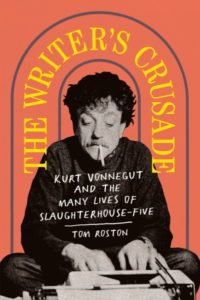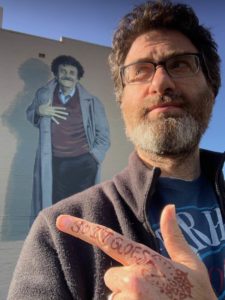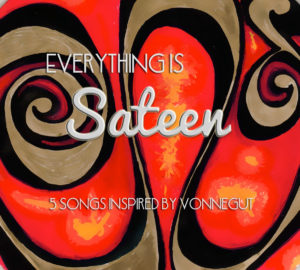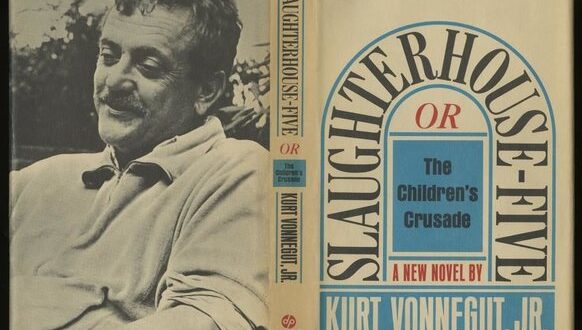Podcast: Play in new window | Download (Duration: 59:03 — 81.1MB)
 In his new book, The Writer’s Crusade: Kurt Vonnegut and the Many Lives of Slaughterhouse-Five, author Tom Roston examines the connection between Kurt Vonnegut’s life and his anti-war novel, Slaughterhouse-Five. Roston spent some time researching his subject here in Bloomington, where the Lilly Library at Indiana University houses the Kurt Vonnegut Manuscript Archives.
In his new book, The Writer’s Crusade: Kurt Vonnegut and the Many Lives of Slaughterhouse-Five, author Tom Roston examines the connection between Kurt Vonnegut’s life and his anti-war novel, Slaughterhouse-Five. Roston spent some time researching his subject here in Bloomington, where the Lilly Library at Indiana University houses the Kurt Vonnegut Manuscript Archives.
Did Vonnegut suffer from Post-Traumatic Stress Disorder? Did Billy Pilgrim? Roston probes Vonnegut’s work, his personal history, and discarded drafts of the novel, as well as original interviews with the writer’s family, friends, scholars, psychologists, and other novelists.
Slaughterhouse-Five was Vonnegut’s first novel to become a bestseller, staying on the New York Times bestseller list for sixteen weeks. In 1970, it was nominated for best-novel Nebula and Hugo Awards, losing both to Ursula Le Guin’s The Left Hand of Darkness.
Its success must have been gratifying to Vonnegut who says in the book’s first chapter, “I would hate to tell you what this lousy little book cost me in money and anxiety and time. When I got home from the Second World War twenty-three years ago, I thought it would be easy for me to write about the destruction of Dresden, since all I would have to do would be to report what I had seen. And I thought, too, that it would be a masterpiece or at least make me a lot of money, since the subject was so big.”
That big subject struggling to find a form was not only the Allied fire bombing and killing of 25,000 civilians in Dresden, but also PTSD – called variously over time: “irritable heart” or Da Costa’s Syndrome, “cannonball wind” or shell shock, war trauma or post-Vientam Syndrome. And it’s this subject and its history that Roston thoroughly covers in his new book.
All of our music today comes from Everything Is Sateen: Five Songs Inspired by Vonnegut by Lusterlit. We’re opening with “Use Me” – inspired by Vonnegut’s 1959 sci-fi novel The Sirens of Titan where we first encounter the Tralfamadorians, aliens who will abduct Billy Pilgrim in Slaughterhouse-Five, published ten years later.
Lusterlit is the literature-inspired duo of Susan Hwang and Charlie Nieland who create songs for the Bushwick Book Club in Brooklyn, New York, a club founded by Hwang that meets monthly employing the talents of local songwriters, artists and chefs who plumb the depths of a chosen literary gem to create a new song (or visual art, dance, film or snack). There are branches in Los Angeles, Seattle, Santa Barbara, New Orleans,Greenville (SC), London and Malmö, Sweden.

GUEST
Journalist Tom Roston worked at The Nation and Vanity Fair, and was a senior editor at Premiere for more than a decade. His work has appeared in the New York Times, New York magazine, LitHub, and more. He is the author of two previous books, I Lost It at the Video Store: A Filmmaker’s Oral History of a Vanished Era and The Most Spectacular Restaurant in the World. He lives in Brooklyn.
RELATED
On Slaughterhouse-Five, the “Ultimate PTSD Novel” by Tom Roston
From Dresden on the 50th Anniversary of ‘Slaughterhouse-Five’ (2019)
The Enduring Legacy Of Slaughterhouse-Five by John Krull
 MUSIC
MUSIC
Everything Is Sateen: Five Songs Inspired by Vonnegut – Lusterlit
“Use Me” (The Sirens of Titan)
“No Answer” (Slaughterhouse-Five)
“Creator” (Breakfast of Champions)
“Everything is Sateen” (Bluebeard)
ID underbed: “Euphio – Noise From The Void” (“The Euphio Question” – a Vonnegut short story)
CREDITS:
Producer & Host: Doug Storm
Executive Producer: Kade Young
 WFHB Bloomington Community Radio
WFHB Bloomington Community Radio


